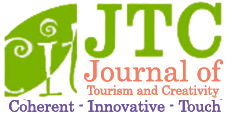About the Journal
JOURNAL OF TOURISM AND CREATIVITY (JTC) is a fully open access peer-reviewed scholarly journal that addresses legal issues and questions arising in Indonesia and the Global Tourism World Wide. This journal aspires to provide a tourism policy, creative tourism, sustainable tourism, tourism management and organization, travel and tourism, leisure and recreation. And other disciplines such as sociology of tourism, anthropology of tourism, psychology of tourism, law tourism, technology and information of tourism, geography of tourism and tourism education. It also encompasses of any applied tourism, such as marine tourism, eco tourism, tourism empowerment of local community, man made tourism, agrotourism within the national and international perspective.
Indonesia is characterized as a heterogeneous nation with European, Islamic, and indigenous legal traditions; often referred to as distinct from its colonial-origin legal system. While World War II ended, Indonesia's endeavors to legal development and democratization have faced challenges such as authoritarianism, inequality, and divided society amidst the unfinished project of legal transplants, as they have been also encountered by many other countries. Empowerment, the new paradigm of tourism sustainable in every aspect of tourism development. The direct multiplier impact on tourism development is the main key for every countries to release their main strategic in this post pandemic era.
Taking Indonesia as the one of largest island country in the world as a starting point for an exploration of all tourism potencies. However, Indonesia has more than 700 hundreds cultural asset. In every single region in Indonesia has different side of culture, language, religion, art and tradition.
As an open-access journal, all contents are freely available without charge to users or their institutions. Users can read, download, copy, distribute, print, search, or link to the full texts of the articles in this journal without prior permission from the publisher or the author.
In 2023, this journal has exclusively published all papers in English. Therefore, it only accepts submissions written in English. The change to the use of the English language aims to improve its international audiences so that the publication is expected to engage more global readership and authorship. All authors interested in submitting their manuscripts to this journal are strongly advised to refer to our Call for New Submissions












